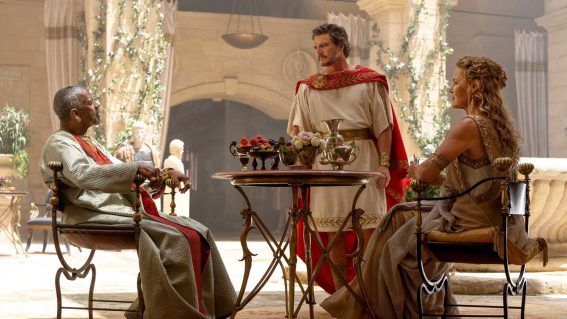Getting Hitched in the ’80s


33 years after his death, and the spectre of Alfred Hitchcock just won’t leave us alone. Last month we watched Anthony Hopkins don a fat suit to play the Master of Suspense in Hitchcock, Sacha Gervasi’s long-awaited biopic-of-sorts. In the yet-to-be-released pile, we can look forward to Brian DePalma getting more Hitchcock out of his system with Passion, and South Korean director Park Chan-wook making his Hollywood debut with Stoker, ostensibly a baroque variant of Hitchcock’s 1943 classic Shadow of a Doubt. Hitch-related things are happening on the small screen too: the recent HBO production The Girl was another take on Hitch (played by Toby Jones), and if you think Psycho IV: The Beginning was the last we saw of Norman Bates, A&E is rolling out the prequel TV series Bates Motel. Oh, and lest we forget, it was National Alfred Hitchcock Day less than a week ago.
Anyway I’ve been going through a phase of watching ‘80s movies lately, which got me to thinking about revisiting Curtis Hanson’s 1987 Hitchcock riff The Bedroom Window, which in turn opened up my mind to the idea that I should somehow just acknowledge my fondness for so-called “Hitchcockian movies”… i.e. those movies that either pay homage to or simply imitate Hitchcock. So here’s is a list of good-to-great movies which Hitchcock might have made if he were still around in the ’80s, with the more obvious likes of DePalma and Roman Polanski* deliberately excluded:
EYEWITNESS
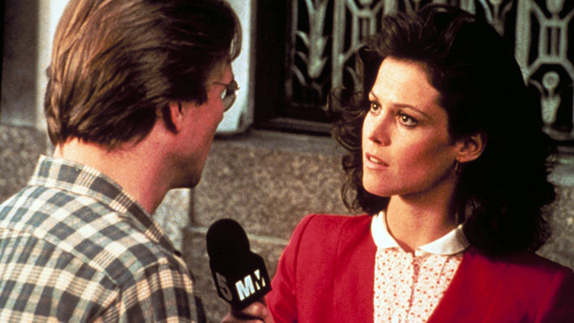
The late Peter Yates** has several great, well-loved films under his belt such as Bullitt and Breaking Away, but also some tremendously underrated ones like Friends of Eddie Coyle, and this murder mystery, which is perhaps played too subdued for a wide audience to embrace as an exciting Hitch-style thriller. Penned by Breaking Away’s writer Steve Tesich, Eyewitness (1981) is sort of like an inverted The Man Who Knew Too Much, starring William Hurt as a janitor who stumbles onto the body of a dodgy Vietnamese businessman and knows nothing about it, but to the detriment of his livelihood, pretends to know more to get into TV reporter Sigourney Weaver’s pants (actually much less crude than I’ve made it sound).
If you’re itching for thrills, you may struggle through the film’s extended meet-cute stuff – it chews up half the running time without significantly pushing the murder plot forward. But it’s a film that grows on you as it progresses, featuring many neat character-based moments that linger in retrospect. If anything, it’s better as a post-Vietnam drama than a potboiler, but the fact that it uses whodunnit/conspiracy conventions to relay larger ideas about post-war assimilation and class divide makes it more interesting and unusual than first meets the eye. A really good support cast helps: James Woods, excellent as Hurt’s bigoted war-vet buddy, who appears to be the chief suspect in the murder; Morgan Freeman, as the cop on the case; and Christopher Plummer, as Weaver’s wealthy man who’s smuggling Jews out of the Soviet.
STILL OF THE NIGHT
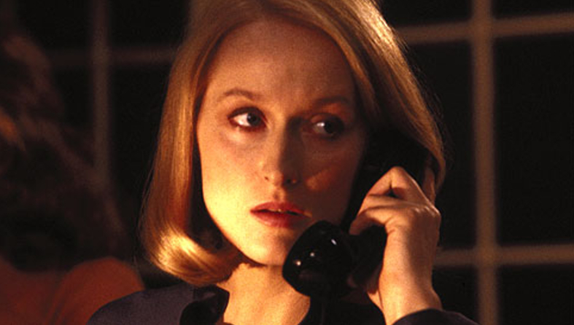
Robert Benton’s Still of the Night (1982) probably relies too heavily on the kind of dream analysis that many found too hokey about Hitch’s Spellbound, but I’m gonna let it slide – and its other faults – because I really dig this film for the understated, sombre mood it sustains throughout (critics have also slammed it for being too “cold”). Roy Scheider*** plays Sam Rice, a psychiatrist who gets romantically involved with a deceased client’s mistress (Meryl Streep, in fine, alluringly icy form) and suspects that she may be responsible for his death. Expect some really ridiculous set-pieces – an early, otherwise mundane scene tries to make us sweat from Scheider trying to hide an incriminating watch from a cop – but essentially these operate on the same heightened emotional level as the fever dream logic of DePalma’s best films (if nowhere near as showy nor perverse), making up substantially for a screenplay that’s – to put it simply – preposterous as hell. The Birds‘ Jessica Tandy has a small role as Rice’s mum (also a shrink!) adding a layer of Hitchcockian Mother Complex-ity to the film. Handsomely shot by the legendary Néstor Almendros (Days of Heaven).
DEAD OF WINTER
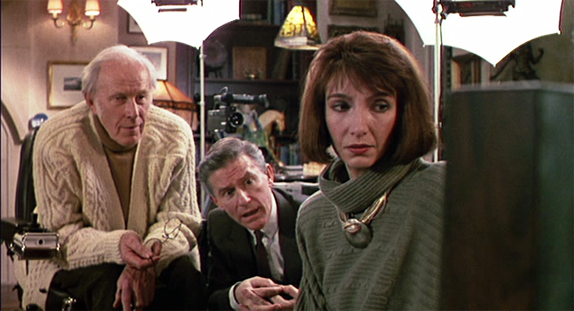
If Dead of Winter (1987) isn’t exactly remembered as one of Arthur Penn’s finest films – it’s a looong way from Bonnie and Clyde (and Little Big Man, and Night Moves) to this gimmicky thriller – it is a prime piece of lurid Hitch-schlock. A remake of the 1944 Joseph H. Lewis film My Name is Julia Ross (also worth a look for B-noir fans!), the film gives Mary Steenburgen THREE roles to chew on, the main one being Katie McGovern, a fledgling actress who nabs a part in an indie film production that she soon discovers does not exist. She’s driven to a middle-of-nowhere manor by the casting agent, Mr. Murray (Roddy McDowall, pure ham), under the impression that a screen test will be done by one Dr. Lewis (Jan Rubes). Instead she’s found herself the victim of a sinister blackmail plot. Howling implausibilities and some genuinely bad acting (see McGovern’s husband and his brother) don’t stop this from being an enjoyably trashy and overwrought time, with lots of spot-the-Hitchcock action (The 39 Steps, Vertigo, Rear Window), blizzardy, isolated Misery-like atmosphere and old-dark-house Gothic chills.
THE BEDROOM WINDOW
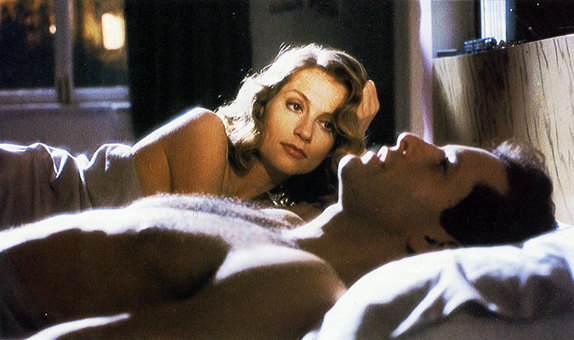
I liked The Bedroom Window (1987) when I first watched it on tape years ago but rewatching it in its full scope aspect ratio on DVD gave me a better appreciation of the film, which I didn’t realise until now was shot by a seasoned, top-notch cinematographer like Gilbert Taylor (Star Wars, Dr. Strangelove). The casting of Steve Guttenberg (Police Academy) here has always divided viewers who think that he’s much too bland to carry it, and those who think his milquetoast demeanour is ideal. I’m more in the latter camp, though debonair Hitch leading man a la Cary Grant he certainly is not. But his everyman “way-in-over-his-head” quality mostly works for his character, Terry Lambert, who decides that it’s a good idea to tell the police he witnessed an attack on a girl (Elizabeth McGovern) he didn’t in order to cover up his affair with his boss’ wife (Isabelle Huppert), who actually did. Adapted from Anne Holden’s novel The Witnesses, it’s an absorbing, better-than-average version of Hitchcock’s wrong man template – and obviously Rear Window – deftly directed by Curtis Hanson (L.A. Confidential). Watch for the terrific courtroom scene with character actor Wallace Shawn as a defense attorney who does a great job of riddling holes in Lambert’s story.
APARTMENT ZERO
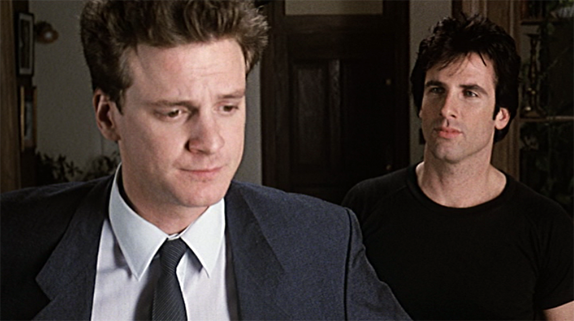
One of the best psychological thrillers of the ‘80s, Martin Donovan’s Apartment Zero (1988) most obviously echoes the thickly implied homoeroticism of Hitchcock films like Rope and Strangers on a Train and the apartment-dwelling paranoia of Polanski’s The Tenant to fuel its compelling, fantastically dark narrative. First-class acting from Colin Firth and Hart Bochner, playing roommates in Buenos Aires, the former an uptight Brit movie buff struggling to keep his revival cinema going, the latter a hunky, mysterious American whom he grows increasingly drawn to. Meanwhile, a spate of brutal, death squad-style serial killings plague the city… A masterful psychodrama, with creepy, riveting ambiguity, crackling tension, oddball characters, a brilliantly twisted finale.
* I rewatched Frantic not too long ago, and it still holds up as top-shelf imitation-Hitch.
** Yates returned to Hitchcockian territory in ‘88 with the McCarthy-era period piece House on Carroll Street, which isn’t as good, but also somewhat underrated. Kelly McGillis plays a Communist (!) photo editor for Life Magazine who stumbles onto a plot to smuggle Nazi scientists into the US. Features a cool Grand Central-set climax, Mandy Patinkin in a juicy villainous role, and beautiful Michael Ballhaus cinematography. Romance between McGillis and FBI agent Jeff Daniels fizzles though. Written by the blacklisted Walter Bernstein.
*** Scheider a few years earlier starred in Jonathan Demme’s Last Embrace, another great Hitchcockian movie that needs to be better known.












